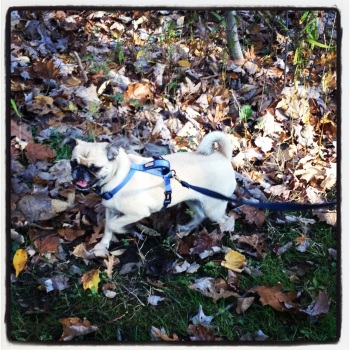 Today’s post is the second short story in the series: The Adventures of Zelda. Once a month I post a short story here on the blog. If you missed the first story or want to learn why I'm writing this series, visit The Adventures of Zelda: Part 1 Beginnings post.
Today’s post is the second short story in the series: The Adventures of Zelda. Once a month I post a short story here on the blog. If you missed the first story or want to learn why I'm writing this series, visit The Adventures of Zelda: Part 1 Beginnings post.
Zelda vs. the Leaf Pile
rom my perch on top of the couch, I watch the leaves blowing from the trees, and the squirrels scurrying through the yard. The weather is perfect for pug walking. The hot and humid days of summer are gone for now, and I am glad for the cooler air and the breeze ruffling through my fur. I can take long walks with the family again. Ben and Lucy just left for school, so I wait for Hannah so we can take our morning walk.
Hannah finds her hoodie and yellow shoes, sits down, and ties her shoes. I run to her and grab the shoelaces with my mouth. I try to help her tie the yellow shoes, but she pushes me away, and I wait by the door until she is ready.
We head out the door a couple minutes later; I veer to the left. Hannah follows my lead, and we turn right onto Edgewood–my favorite street. A canopy of large oak and maple trees lines both sides of the street, creating shade on the sidewalks at any time of the day. The big trees attract squirrels and chipmunks–animals I love to chase. The houses are filled with dogs of all shapes and sizes. My favorite spot on this street is a light post on the corner of Edgewood and Meadowfield. The light post rests on a popular cross-section, so many dogs frequent it. Every visit to the light post introduces me to a new smell. I love it. I lead the way down Edgewood, pulling Hannah along behind me.
Squirrel!
I spot the first squirrel midway down Edgewood. The squirrel is on the opposite side of the street out of my reach, so I ignore its taunting. Meanwhile, in the next yard on our side of the street, a second squirrel runs up a tree. Without hesitation, I charge for the tree. I sprint four strides before being yanked backward by Hannah.
“Zelda, calm down!” Hannah yells. I ignore her and press forward. The tree is only a few more steps away.
I want that squirrel. It’s so close.
When I reach the tree, I see the squirrel a few branches above me. I jump up and try to gain traction on the tree trunk.
“Let’s go!” Hannah pulls me away from the tree; I have to keep walking. I walk a few paces and sit down in the grass, disappointed. Hannah pleads with me to keep walking. I lie on the grass and look at the street ahead.
The light post!
I get up and run towards the corner light post at the end of the street. As I approach the corner, I sneeze. Something isn’t right. I don’t smell the normal mix of dog scents. I keep walking and see the problem. I see something on top of the ground around the light post. I walk cautiously toward the corner.
As I approach the corner, I realize the barrier is a collection of leaves in one big pile. I stop and stare at the leaf pile. Why would anyone put a bunch of leaves in a pile? And why did they have to do it on my corner light post?
I can’t tell if the pile is covering something. It probably isn’t covering up anything dangerous, but I don’t want to risk walking into thorns. I continue walking, ignoring the corner light post and the leaf pile for today. I bet the pile will be gone tomorrow.
Hannah and I stroll past the elementary school and through the park. I see two more squirrels, but I don’t catch either one. When we arrive home, I’m thirsty and exhausted. I drink a bowl of water and sprawl across the couch.
On our walks the next few days, I lead Hannah or Nate to the corner light post, but the leaf pile remains. Unsure what to do now that the leaf pile seems permanent, I lead Nate in the opposite direction of our normal route. We turn down Sunbrook and start walking. I haven’t walked on Sunbrook in several days. Sunbrook has huge oak trees in most of the yards, many more than Edgewood, but Sunbrook lacks dogs, so the street is not quite as fun.
While we walk down the street, I notice something strange in the distance. I pick up the pace; I recognize the similar shape. It’s another leaf pile. I keep walking.
When we reach the corner of Sunbrook and Meadowfield, I turn left towards Edgewood. When I turn the corner, I see another leaf pile. My excitement rises. Since more leaf piles have appeared, maybe the other leaf pile will be gone. We pass the elementary school, and Nate stops to talk to the man in the yellow shirt. The bright yellow shirt blinds me. I want to see the light post. I bark and pull Nate forward.
We arrive at the corner light post. The leaf pile remains. I sigh, ignoring the squirrel running across the street. I am too distraught by the leaf piles everywhere; they surround fire hydrants, tree trunks, and light posts. I don’t know what to do.
When we return home, Nate takes a seat on the couch and turns on the television. I curl up in his lap and fall asleep, trying to forget about the leaf piles.
I awake later in the afternoon. I feel better, much more refreshed and light-hearted. It is amazing what a good nap can do. Nate asks if I want to go outside. I answer by waiting at the front door. He takes me out to the backyard. I notice the grass is almost covered by red, yellow, and orange leaves. I hear a noise and look at the next yard over. I see Don, our neighbor, working outside in his flower beds. He is raking the leaves from the flower beds and putting the leaves into a pile.
He’s making a leaf pile!
I start running towards the front yard, but Nate pulls me inside. I will have to wait to test my theory.
After dinner, Nate grabs my harness. I am so excited for this walk; I run at least twenty circles around Nate before he catches me and puts on the harness. When he opens the door, I run for the closest leaf pile I can find. There are none on our street so we turn down Edgewood. I see a leaf pile across the street, and I pull Nate in that direction. He obliges, and we cross the street. I start running for the leaf pile and lunge into it, hoping I can make it through. The leaves move out of my way and collapse around me. I stop and smile. I am in the middle of the leaf pile. The leaves come up to my neck, but it’s okay. I can breathe. The leaves feel great, and the aromatic smells overwhelm my nose. The leaf pile is better than the corner light post.
I start kicking the leaves. The leaves fly in the air in every direction.
“Zelda, you are getting me dirty,” Nate mumbles. I ignore him. Kicking the leaves is so much fun, and the amount of leaf piles on our route is endless. I walk out of the leaf pile. I see another pile a house away. I start running.



 1.
1. 
 2.
2. 
 3.
3. 
 4.
4. 


 NaNoWriMo stands for National Novel Writing Month. Every November writers across the world set a goal- to write a novel of 50,000 words during the month of November.
NaNoWriMo stands for National Novel Writing Month. Every November writers across the world set a goal- to write a novel of 50,000 words during the month of November.






 6. The Adventures of Sherlock Holmes by Sir Arthur Conan Doyle - As I write this post, I'm halfway through this collection of Sherlock Holmes short stories. I've enjoyed the stories much more than the first two novels. I find myself paying closer attention when I read which is a nice change of pace for me. I also enjoy reading the short story format. I can sit down for fifteen minutes and read a story and save the next one till later. With a good novel, I become engrossed and don't want to stop reading which can have unfortunate side effects. Overall, I'm loving the Sherlock stories.
6. The Adventures of Sherlock Holmes by Sir Arthur Conan Doyle - As I write this post, I'm halfway through this collection of Sherlock Holmes short stories. I've enjoyed the stories much more than the first two novels. I find myself paying closer attention when I read which is a nice change of pace for me. I also enjoy reading the short story format. I can sit down for fifteen minutes and read a story and save the next one till later. With a good novel, I become engrossed and don't want to stop reading which can have unfortunate side effects. Overall, I'm loving the Sherlock stories.